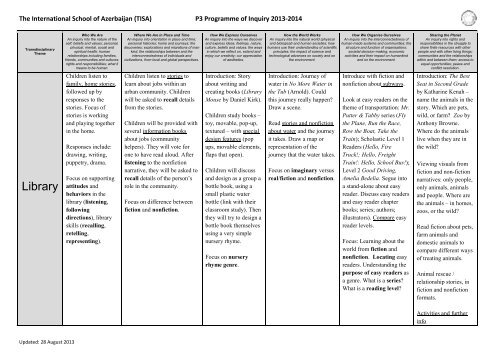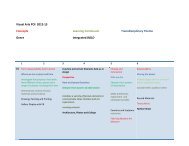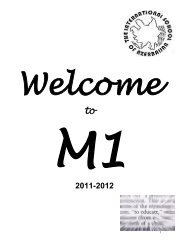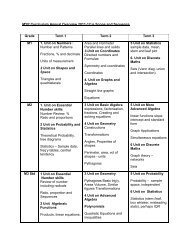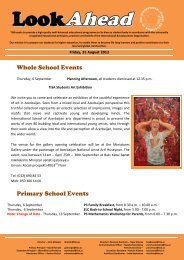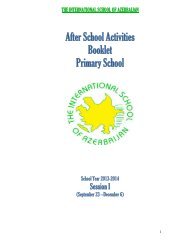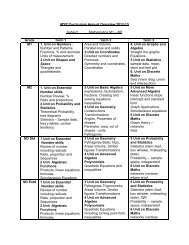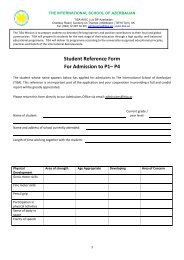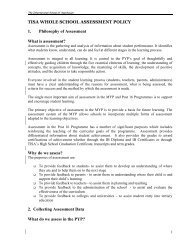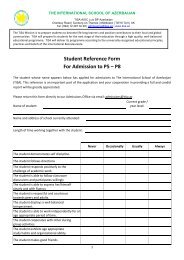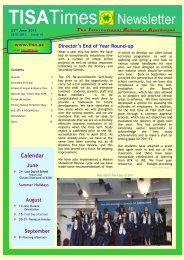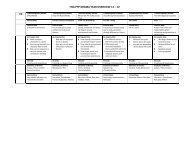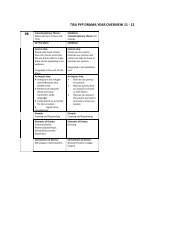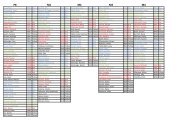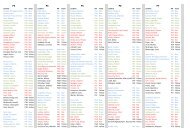The International School of Azerbaijan (TISA) P3 Programme of Inquiry 2013-2014
P3 Year Overview 2013-14 - The International School of Azerbaijan
P3 Year Overview 2013-14 - The International School of Azerbaijan
You also want an ePaper? Increase the reach of your titles
YUMPU automatically turns print PDFs into web optimized ePapers that Google loves.
Libr ary<br />
<strong>The</strong> <strong>International</strong> <strong>School</strong> <strong>of</strong> <strong>Azerbaijan</strong> (<strong>TISA</strong>) <strong>P3</strong> <strong>Programme</strong> <strong>of</strong> <strong>Inquiry</strong> <strong>2013</strong>-<strong>2014</strong><br />
Transdisciplinary<br />
<strong>The</strong>me<br />
Library<br />
Who We Are<br />
An inquiry into the nature <strong>of</strong> the<br />
self; beliefs and values; personal,<br />
physical, mental, social and<br />
spiritual health; human<br />
relationships including families,<br />
friends, communities and cultures;<br />
rights and responsibilities; what it<br />
means to be human.<br />
Children listen to<br />
family, home stories,<br />
followed up by<br />
responses to the<br />
stories. Focus <strong>of</strong><br />
stories is working<br />
and playing together<br />
in the home.<br />
Responses include:<br />
drawing, writing,<br />
puppetry, drama.<br />
Focus on supporting<br />
attitudes and<br />
behaviors in the<br />
library (listening,<br />
following<br />
directions), library<br />
skills (recalling,<br />
retelling,<br />
representing).<br />
Where We Are in Place and Time<br />
An inquiry into orientation in place and time;<br />
personal histories; home and journeys; the<br />
discoveries; explorations and migrations <strong>of</strong> man<br />
kind; the relationships between and the<br />
interconnectedness <strong>of</strong> individuals and<br />
civilizations, from local and global perspectives.<br />
Children listen to stories to<br />
learn about jobs within an<br />
urban community. Children<br />
will be asked to recall details<br />
from the stories.<br />
Children will be provided with<br />
several information books<br />
about jobs (community<br />
helpers). <strong>The</strong>y will vote for<br />
one to have read aloud. After<br />
listening to the nonfiction<br />
narrative, they will be asked to<br />
recall details <strong>of</strong> the person’s<br />
role in the community.<br />
Focus on difference between<br />
fiction and nonfiction.<br />
How We Express Ourselves<br />
An inquiry into the ways we discover<br />
and express ideas, feelings, nature,<br />
culture, beliefs and values; the ways<br />
in which we reflect on, extend and<br />
enjoy our creativity; our appreciation<br />
<strong>of</strong> aesthetics.<br />
Introduction: Story<br />
about writing and<br />
creating books (Library<br />
Mouse by Daniel Kirk).<br />
Children study books –<br />
toy, movable, pop-up,<br />
textured – with special<br />
design features (pop<br />
ups, movable elements,<br />
flaps that open).<br />
Children will discuss<br />
and design as a group a<br />
bottle book, using a<br />
small plastic water<br />
bottle (link with their<br />
classroom study). <strong>The</strong>n<br />
they will try to design a<br />
bottle book themselves<br />
using a very simple<br />
nursery rhyme.<br />
Focus on nursery<br />
rhyme genre.<br />
How the World Works<br />
An inquiry into the natural world (physical<br />
and biological) and human societies; how<br />
humans use their understanding <strong>of</strong> scientific<br />
principles; the impact <strong>of</strong> science and<br />
technological advances on society and on<br />
the environment.<br />
Introduction: Journey <strong>of</strong><br />
water in No More Water in<br />
the Tub (Arnold). Could<br />
this journey really happen?<br />
Draw a scene.<br />
Read stories and nonfiction<br />
about water and the journey<br />
it takes. Draw a map or<br />
representation <strong>of</strong> the<br />
journey that the water takes.<br />
Focus on imaginary versus<br />
real/fiction and nonfiction.<br />
How We Organise Ourselves<br />
An inquiry into the interconnectedness <strong>of</strong><br />
human-made systems and communities; the<br />
structure and function <strong>of</strong> organisations;<br />
societal decision-making; economic<br />
activities and their impact on humankind<br />
and on the environment.<br />
Introduce with fiction and<br />
nonfiction about subways.<br />
Look at easy readers on the<br />
theme <strong>of</strong> transportation: Mr.<br />
Putter & Tabby series (Fly<br />
the Plane, Run the Race,<br />
Row the Boat, Take the<br />
Train); Scholastic Level 1<br />
Readers (Hello, Fire<br />
Truck!; Hello, Freight<br />
Train!: Hello, <strong>School</strong> Bus!);<br />
Level 2 Good Driving,<br />
Amelia Bedelia. Segue into<br />
a stand-alone about easy<br />
reader. Discuss easy readers<br />
and easy reader chapter<br />
books; series; authors;<br />
illustrators). Compare easy<br />
reader levels.<br />
Focus: Learning about the<br />
world from fiction and<br />
nonfiction. Locating easy<br />
readers. Understanding the<br />
purpose <strong>of</strong> easy readers as<br />
a genre. What is a series?<br />
What is a reading level?<br />
Sharing the Planet<br />
An inquiry into rights and<br />
responsibilities in the struggle to<br />
share finite resources with other<br />
people and with other living things;<br />
communities and the relationships<br />
within and between them; access to<br />
equal opportunities; peace and<br />
conflict resolution.<br />
Introduction: <strong>The</strong> Best<br />
Seat in Second Grade<br />
by Katharine Kenah –<br />
name the animals in the<br />
story. Which are pets,<br />
wild, or farm? Zoo by<br />
Anthony Browne.<br />
Where do the animals<br />
live when they are in<br />
the wild?<br />
Viewing visuals from<br />
fiction and non-fiction<br />
narratives: only people,<br />
only animals, animals<br />
and people. Where are<br />
the animals – in homes,<br />
zoos, or the wild?<br />
Read fiction about pets,<br />
farm animals and<br />
domestic animals to<br />
compare different ways<br />
<strong>of</strong> treating animals.<br />
Animal rescue /<br />
relationship stories, in<br />
fiction and nonfiction<br />
formats.<br />
Activities and further<br />
info<br />
Updated: 28 August <strong>2013</strong>


